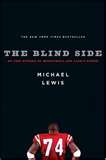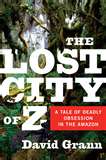Born to Run is gripping, well-written, and destined to perpetuate the cult of barefoot running. Particularly inspiring to a fat guy like me.
The Big Short: Inside the Doomsday Machine (2010), 266 pages, by Michael Lewis
The Big Short, by Michael Lewis, explains how a few people made a lot of money shorting worthless mortgage-based securities. A terrific tale of greed and the Emperor’s New Clothes.
The Blind Side: Evolution of a Game (2006), 304 pages, by Michael Lewis
The Blind Side, by Michael Lewis, reads subtly as an apologia for the Tuohys and their decision to bring sports athlete Michael Oher into their Mississippi Christian home. It works best when talking about the strategic interests and money that drives professional football, and the farm leagues that are college. The book is better than the movie, which makes necessary compromises in order to tell the story.
Eulogy for James K. McLean
Dad wasn’t very good at good-byes, and he always had one more story to tell. You can appreciate how hard it is for us – his children – in making some final comments, not to keep you for at least 30 more minutes. Each. We will try not to be long.
First of all, thank you for coming today to help us with our grief over the loss of Dad. Thank you Fr. Hightower and Fr. Robinson, and Ann – we can’t say enough good things about your being here today. We’d also like to thank the Island community for putting the circle of hands of the grandchildren and the hearts of the great grandchildren around Dad. We mourn, but we also celebrate.
We spent some time trying to find the right words to express our thoughts. We each have different memories and can’t begin to tell you all of them here. But one thing that repeatedly came up was Dad’s devotion to Mom. Before Mom, we understand he was a bit of a wild one. Of course Fr. Robinson can fill you in on the details. We only saw it in the form of Dad driving an orange Volkswagen mini-bus and telling us kids, “Don’t wave at the police and draw unnecessary attention.”
After he met Mom, he settled down a bit and spent his energy in other ways. Mom and Dad were inseparable. They made each other better. They celebrated their 50th Wedding Anniversary in April. It was never just Mom. Or Just Dad. It was always Mom and Dad. For example, “Hi Dad. Can I speak to Mom?” They discussed everything, but Dad carried the weight of the important decisions, like whether or not to invade China.
Even when Dad was alone, relaxing, Mom was always on his mind. He liked to listen to music. Sit in his easy chair, and drink tea, and listen to music. One of us might call in the afternoon and say, “Watcha doin?” He’d say, “sitting here. Drinking tea. Listening to music. Got to get up and get something done before Mom gets home.”
In the past few days we have heard many times that Dad’s jokes were appreciated. Almost as many times as we heard the jokes themselves. But, all joking aside, Dad was his whole life a person of integrity and honesty and kindness. There was never a question of who or what was important to him. He sacrificed repeatedly and consistently to make a better life for his family. It was not without challenge, much of it from us children. But, although he had strong principles and values, he never demanded that we live our lives one way or another. He took us as we were, sometimes with grumbling, sometimes with joy.
As we grew older, dad became more to us. He became a friend. And as we gather, and we look at each other, we find that the people we have become share his values and principles. We look at his grandchildren and see small mannerisms and attitudes that surprise us with their similarity to Dad. We love Mom. We tell bad jokes. And we’re not very good at good-byes.
On September 5, the sky momentarily darkened as Dad passed from this life into the next. But each day with his passing, as we experience the love of his neighbors, the support of the community, hear a bad joke, or see the mannerism, the twinkle in the eye, or that unmistakable figure of speech from one of the grandchildren, the clouds get a little thinner, the sky a little bluer, the sun a little brighter, and we can thank God that Dad was able to share his life with all of us.
We hope that you will join us after the Funeral Mass for food and a celebration of Dad’s life. Dad would have wanted that.
Dad – before you go, do you have time for some more stories?
—
The Children of James K. McLean
Thank you.
Best Films of the last 20,000 Years
My friend Emily and I put together the following work in process — a list of the best films of the last 20,000 years.
Why the last 20,000? Well, there’s still the possibility that the lost city of Atlantis will have an extensive collection of never-before-seen movie masterpieces.
Epics
- Lawrence of Arabia
- Once Upon a Time in the West
- Reds Continue reading Best Films of the last 20,000 Years
Woyzeck, ein Film von Werner Herzog (1979)
Pity the poor soldier, the useless toy of the State, the plaything of doctors, the grotesque romantic who yearns to love, but cannot be loved. Thirty-one years after it was filmed, mostly in single takes in 18-days of shooting, the film perplexes and captivates the viewer. It is, at its most fundamental, a film about not fitting in. There are, once again, some astounding drawn out shots of Klaus Kinski running. Extraordinary acting, a fragmented story and script, disquieting themes of class differences, disenfranchisement, medical experimentation, jealousy, and mental illness.
The Omnivore’s Dilemma, by Michael Pollan (2006) (450 pages)
The Omnivore’s Dilemma, by Michael Pollan (2006) (450 pages)
Is it too much to ask? “What it is we’re eating. Where it came from. How it found its way to our table. And what, in a true accounting, it really cost.” Omnivore, page 411. These are the ponderable questions that Michael Pollan tackles with one eye turned toward beauty, the other toward industrial madness, while strewn before his crossed eyes lie the rotten fruits and shadowy carcasses that are become our modern diet.
A clash of the titans, Babette’s Feast versus Super Size Me in a pie-eating contest to the finish. And very good writing.
Nosferatu, Phantom der Nacht (1979), ein Film von Werner Herzog
Nosferatu, Phantom der Nacht (1979), ein Film von Werner Herzog.
I avoided Werner Herzog’s Nosferatu for years for several reasons. One, we don’t need another Count Dracula movie. Two, Coppola’s Bram Stoker’s Dracula (1992) traumatized me. Three, it had that The Cabinet of Dr. Caligari (1920) look. My aversion was misplaced. Although it has its tedious moments, Klaus Kinski’s performance is a creepy one for the ages, and Herzog allows the camera and the music to tell the story. A viewing is worth it for a single scene where Nosferatu traipses pathetically away from the camera, like a rat looking for food with an ultimate destination in mind, in the courtyard before the Nieuwe Kerk, Delft, Netherlands (I think). Don’t watch this movie if you hate rats or the idea of a pathetic immortal lonely Klaus Kinski playing a rat.
The Blind Side, by Michael Lewis (2008) (288 pages)
The Blind Side: Evolution of a Game, by Michael Lewis (2008) (288 page)
Liar’s Poker broke down for us over 20 years ago how to play the game on Wall Street. Moneyball told us how to use statistics to help a baseball team with an unfair advantage win the game. In The Blind Side, Michael Lewis explains how the game of football has evolved, particularly since 1981 when Lawrence Taylor exploded into the backfield and terrorized quarterbacks.
The book also tells how a small group of people can make a world of difference in a very large person’s life. Michael Jerome Oher, a one-time homeless, possibly illiterate 6’6″ 355 pound black kid from West Memphis with a measured IQ of 80, and the white upper-class family that takes him in, are the threads that holds the fabric of the book together. Whether or not the real-life story is distorted for dramatic purposes (his IQ is later measured at 100 or 110 — average — and he was on the honor roll two out of four years at Ole Miss), or presented in a way that defends the motivation of the family (and friends of the author) that took him in against accusations that they were boosters giving gifts to a college athlete, it’s a great, inspiring story, and one that will make you love the South and (college) football again.
The Lost City of Z: A Tale of Deadly Obsession in the Amazon, by David Grann (2009).
The Lost City of Z: A Tale of Deadly Obsession in the Amazon, by David Grann (2009) (448 pages)
My read of Percy Harrison Fawcett’s adventures in the Amazon followed shortly on the heels of reading two exceptional books about Shackleton’s inspiring journey to the Antarctic. Let’s compare the two men — Fawcett and Shackleton — and their motivations and styles.
Their motivations were similar. They both had that gritty obsessive need to explore, colonize, leave a mark, make a name, and become a permanent artifact of a disappearing World British Empire. Their styles, however, were distinctly different. Shackleton, through risk management, tenacity, and a singular desire to protect his crew, saved about 3o men from an almost impossible situation. Fawcett, with his over-inflated ego and oppressive management style, managed to alienate himself over several decades from most of his supporters in his quest to find the Lost City of Z, and to eventually disappear into the jungle with his 21 year-old son and his son’s friend, never to be seen again.
But that’s the story within the story. Perhaps even more interesting was the willingness of an overweight middle-aged reporter to pick up one day from New York, buy a backpack and hiking boots, and head to the Amazon, to see if he could accomplish what no one else has been able to do for almost one hundred years — determine the fate of Fawcett, his son, and his son’s friend, and find the Lost City of Z.


